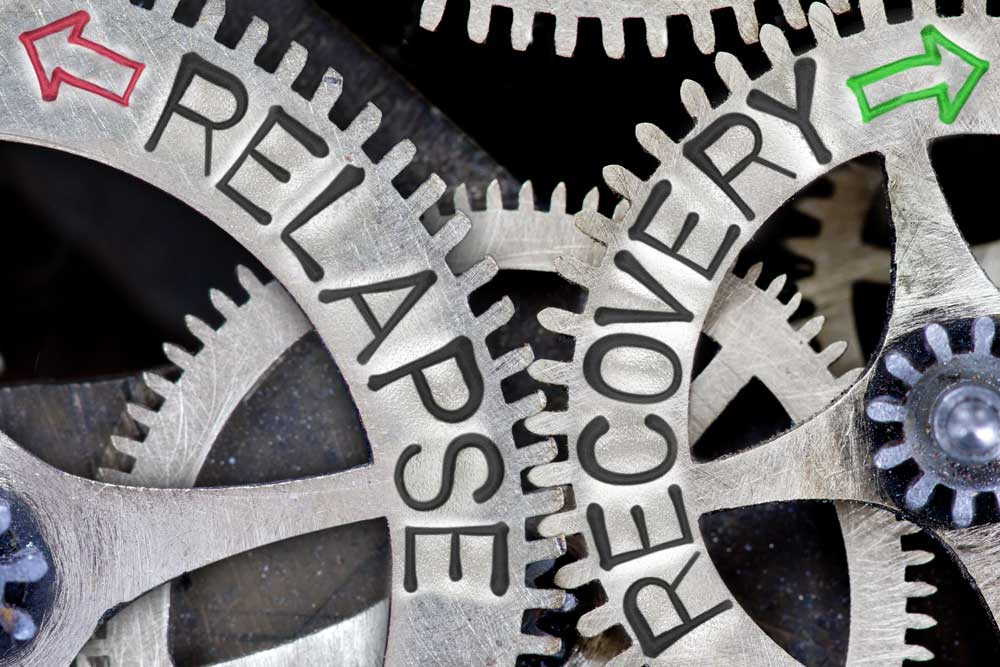There’s a reason we often say someone is “in recovery,” and not that they are “recovered” from addiction. It’s a lifelong process of making choices and changing behaviors to overcome the pull of addiction.
Regardless of how long someone has been living a sober lifestyle, they still face the possibility of relapsing. It is not a sign of weakness or of an inability to change; relapse may just be part of the recovery process for some people.
What Is Considered a Relapse in Addiction?
You may consider relapse as any instance during which a person in addiction rehab or recovery engages in previous behaviors to which they were addicted: they drink alcohol, use drugs inappropriately, participate in gambling, etc…
Relapse is technically defined as a deterioration of someone’s condition after they had been making improvements. So, it could be possible for a person in recovery to take a step backward without it being considered a full-blown relapse.
- Slip or Lapse – A minor instance of revisiting addictive behavior
- Relapse – A significant, prolonged use of addictive substances or participation in addictive activities
This is not to be used as an excuse for someone in addiction rehab to make mistakes; it’s simply an explanation that addiction, recovery, and relapse have grey areas. Not all progress is linear but, hopefully, a strong treatment plan is in place to offer support at all times.
Some treatment centers or treatment plans may define slips and relapses differently, so be sure everyone involved in your recovery is on the same page when it comes to expectations.
Tips for Avoiding a Relapse
Avoidance of triggers is crucial for a person in addiction rehab. But it isn’t always possible to stay away from people, places, or the emotions that previously enabled addictive behavior to play out. Regardless of circumstance, here are some tips for avoiding a relapse.
Avoidance is Key
If at all possible, remove toxic people and past times from your life so you can avoid a relapse. This can be a hard decision to make because it can feel isolating, but it will be worth it in the long run. This may mean finding a new place to live, a new job, or even a new hobby in order to avoid triggers. It may feel overwhelming, but remember that nothing is permanent during recovery. You will continue to evolve as a person in recovery, and that means your environment will change as well.
Act Fast
SOL Health and Wellness believes that treatment in a timely manner is one key to success. If you find yourself in a situation that prompts you to waiver from sobriety, turn to your support system immediately. Don’t try to rationalize your behavior and fly solo into potentially triggering environments.
Show Up
You may feel confident in your ability to resist temptation while undergoing treatment for addiction, but that doesn’t mean you can skip out on scheduled therapy, evaluations, or aftercare programs. It’s important to give your full attention to the treatment plan that’s been developed for you in order for you to have the tools necessary to maintain your sober lifestyle.
Showing up also applies to people in your life who aren’t involved in your recovery process. As you heal from addiction, it’s important to be involved in activities that support your new life. Find support in new hobbies with people who share your interests. Join a gym, a book club, or cooking classes.
Journal
Whether it’s part of your specified treatment program or not, you may find that journaling helps you avoid relapse. Keeping a log of your life, and how you react to certain things, can help you identify triggers that threaten your recovery progress. Take literal note of what brings up feelings that used to be too difficult to cope with. Reflect on those triggers and work with your therapist or support group on ways you can avoid those situations in the future. It can be encouraging to see how you utilized your coping skills in situations that would have previously prompted you to engage in harmful actions.
Take Your Meds
Whether you’re utilizing addiction rehab supplements or prescribed medication as part of your recovery plan, be sure to stay on your regular schedule and dosage. Many times, when a medication is doing its job, we get confident and think we are doing well enough to stop cold turkey. It’s wonderful if a medication or supplement is helping you in recovery, but it’s never a good idea to self-wean off your prescribed dosage. Always consult your doctor and/or therapist if you would like to make changes to your medication.
Remember, relapsing is not the same as failing. It may be an indicator that your current addiction rehab plan needs to be adjusted, whether that’s a new form of therapy, a different medication, or an alternative treatment.
